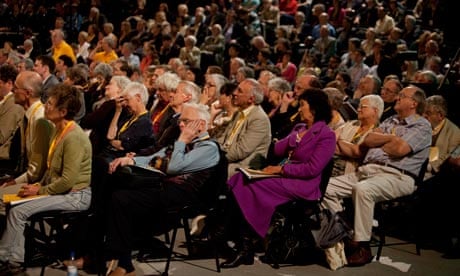The government has admitted that a key motive for its plan to expand secret courts is to shield itself politically from charges that Britain has been complicit in the abuse of detainees abroad.
Ministers have previously argued that more secret courts are needed to protect national security. But documents seen by the Guardian make it clear the government believes it would also benefit politically from the measure because it could defend itself against sensitive charges behind closed doors, without the details ever being made public.
The admissions are contained in official "impact assessments" of the justice and security bill.
The bill, which will be debated at the Liberal Democrat conference on Tuesday in a move from the party's grassroots to overturn the policy, is seen by critics as an attempt to prevent sensitive information in the hands of the security and intelligence agencies from being disclosed in court. High-powered Lib Dem lawyers including Lord Marks QC have been lined up by the leadership to defend the bill's aims at the conference, and to reject the move from party activists to throw out key passages of the bill.
Ministers say the proposals are designed in civil cases to allow some of the material to be examined by a judge using so-called closed material proceedings, rather than using public interest immunity certificates, that at present can prevent any evidence being examined.
Under the bill neither victims of alleged abuse nor their lawyers would be able to hear arguments made against them by MI5, MI6 or the police. A judge would be forced to consider claims by ministers that such information would damage national security.
The impact assessment documents admit that the benefit of the bill, from the government's point of view, is that it would reduce "reputational and political costs to the UK associated with the current system, whereby the government can be unable to defend itself from the serious charges of complicity in false imprisonment and mistreatment of individuals overseas".
The government also admits that the potentially adverse impacts of the bill "are likely to fall on black and Asian Muslim men by virtue of their over-representation in civil cases involving national security where sensitive information is being considered".
Many recent court cases, the government continues, "involve claimants who are men from the following racial groups: Asian, Middle Eastern, north African, and from the following religion: Islam".
The government is required under the 2010 Equality Act to draw up assessments of the impact of proposed laws on discrimination, harassment and victimisation.
Evidence that MI5 and MI6 knew that British citizens or residents were abused and tortured by the CIA in Guantánamo Bay and elsewhere, and that MI6 helped to abduct and render Libyan dissidents into the hands of Muammar Gaddafi's secret police, is the sort of information the bill is designed to suppress, critics of the measure say.
Clare Algar, executive director of the legal charity Reprieve, said: "What is particularly revealing is that a reduction in 'political costs' – in other words, sparing the embarrassment of politicians – is identified as a key benefit."
Lord Wallace, the advocate general for Scotland, said the measures were misunderstood. "This might seem counter-intuitive, but we are trying through the reforms to make it easier for evidence to be challenged. At present, so much evidence is subject to public interest immunity certificates that the whole case can be gutted. Our proposals allow the security service to be examined judicially where otherwise the case might just be pulled and settled without any independent judicial examination of the allegations.
"It is very odd that the people who might want this examination are saying no to our proposals. The consequence of not having closed material proceedings is not that this information all comes out in open proceedings. For reasons of national security the evidence will not be seen and in most cases the government will settle. That is not healthy because the issues are not determined.
"People who are very often putting their lives at risk are not being allowed for their case to be heard," he stressed. He added: "We want these proceedings for a minimum of cases, and if we can find a way of reassuring parliament these measures will only be used in the last resort, we will."




Comments (…)
Sign in or create your Guardian account to join the discussion